Globalization of Economic
六级常用单词
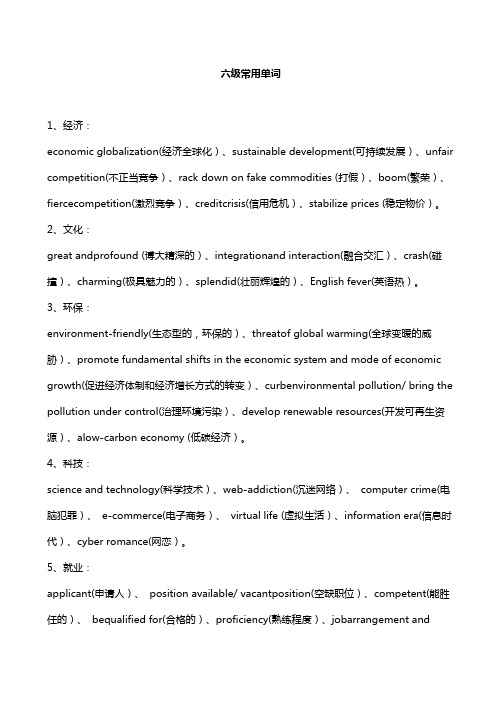
六级常用单词1、经济:economic globalization(经济全球化)、sustainable development(可持续发展)、unfair competition(不正当竞争)、rack down on fake commodities (打假)、boom(繁荣)、fiercecompetition(激烈竞争)、creditcrisis(信用危机)、stabilize prices (稳定物价)。
2、文化:great andprofound (博大精深的)、integrationand interaction(融合交汇)、crash(碰撞)、charming(极具魅力的)、splendid(壮丽辉煌的)、English fever(英语热)。
3、环保:environment-friendly(生态型的,环保的)、threatof global warming(全球变暖的威胁)、promote fundamental shifts in the economic system and mode of economic growth(促进经济体制和经济增长方式的转变)、curbenvironmental pollution/ bring the pollution under control(治理环境污染)、develop renewable resources(开发可再生资源)、alow-carbon economy (低碳经济)。
4、科技:science and technology(科学技术)、web-addiction(沉迷网络)、computer crime(电脑犯罪)、e-commerce(电子商务)、virtual life (虚拟生活)、information era(信息时代)、cyber romance(网恋)。
5、就业:applicant(申请人)、position available/ vacantposition(空缺职位)、competent(能胜任的)、bequalified for(合格的)、proficiency(熟练程度)、jobarrangement andbenefit(工作待遇和福利)、promotion (晋升)、gender-biased(性别歧视的)、appearance-biased(相貌歧视的)。
全球化Globalization英文论述
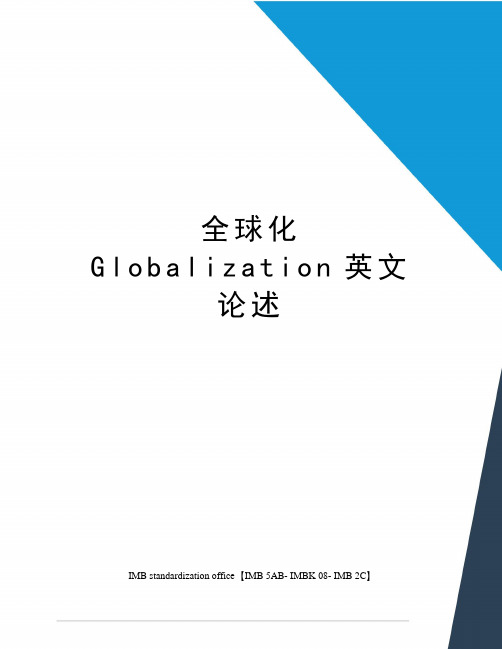
全球化G l o b a l i z a t i o n英文论述IMB standardization office【IMB 5AB- IMBK 08- IMB 2C】G l o b a l i z a t i o n Globalizationis the process of international integration arising from the interchange of, products, ideas and other aspects of.Advances in andinfrastructure, including the rise of theand its posterity the, are major factors in globalization, generating furtherof economic and cultural have connection into a whole, forming a global no one nation can go out of the world and the development of the closed. Economic globalization:Economic globalization is the increasing economic interdependence of national economies across the world through a rapid increase inmovement of goods, service, technology and the globalization of business is centered around the diminution of international trade regulations as well as tariffs, taxes, and other impediments that suppresses global trade, economic globalization is the process of increasingbetween countries, leading to the emergence of a global marketplace or a single world world economy is very country's economic crisis is likely to affect the world- globalization:has increased cross-cultural contacts but may be accompanied by a decrease in the uniqueness of once-isolated as rock, jeans, such as Coca-Cola spread around the world. For example,is available in Germany as well as Japan but Euro-Disney outdraws the city of Paris, potentially reducing demand for "authentic" French 's contribution to the alienation of individuals from their traditions may be modest compared to the impact of modernity itself .Globalization has expanded recreational opportunities by spreading pop culture, particularly via the Internet and satellite television.theconnects computer users around the world. From 2000 to 2009, the number of Internet users globally rose from 394 million to billion.By 2010, 22 percent of the world's population had access to computers with 1 billionsearches every day, 300 million Internet users reading blogs, and 2 billion videos viewed daily on YouTube. The example of globalization:AIRBUS,ADIDAS.Globalization has a lot of good or bad influence to talk about the positive:worldwide the number of common standards; the growth of international trade faster than the world economic growth;the proportion of multinational companies in the world economy ;the development of the global financial system;and More and more international cultural influence, such as through the export of Hollywood movies;promote the development of international tourism ;a lot of information resources sharing via the bad influence is the widening gap between the rich and poor;the increase of illegal immigrants;The expansion of terrorism;Its unemployment rate increaseThe Finally, statement about my point of trend of globalization is irreversible, we should conform to this trend, we should not go against you resist the globalization is obvious, north Korea is resist globalization, so the economy is backward, and there also very miserably of people's makes countries can share resources, cheap goods, technology have very convenient also, human resources also can free flowbetween countries, promote the prosperity of the national the same time, also promote the spread of cultural globalization, cultural communication is also more frequently, is conducive to the development of national a lot of the benefits of globalization, but also should pay attention to protect our country own business brand, technology, enhance the value of the independent brand, pay attention to brand building, in this way, can we have their own advantages in the globalization.。
经济类的英语作文
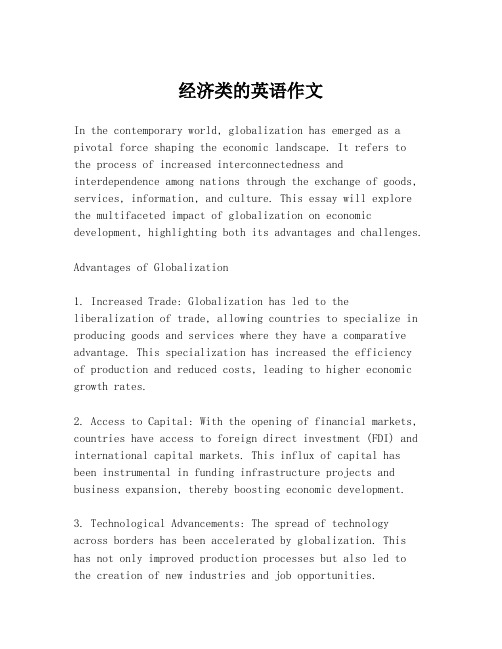
经济类的英语作文In the contemporary world, globalization has emerged as a pivotal force shaping the economic landscape. It refers to the process of increased interconnectedness and interdependence among nations through the exchange of goods, services, information, and culture. This essay will explore the multifaceted impact of globalization on economic development, highlighting both its advantages and challenges.Advantages of Globalization1. Increased Trade: Globalization has led to theliberalization of trade, allowing countries to specialize in producing goods and services where they have a comparative advantage. This specialization has increased the efficiency of production and reduced costs, leading to higher economic growth rates.2. Access to Capital: With the opening of financial markets, countries have access to foreign direct investment (FDI) and international capital markets. This influx of capital has been instrumental in funding infrastructure projects and business expansion, thereby boosting economic development.3. Technological Advancements: The spread of technology across borders has been accelerated by globalization. This has not only improved production processes but also led to the creation of new industries and job opportunities.4. Cultural Exchange: The exchange of ideas and cultures has enriched societies and promoted innovation. This cultural diversity can be a source of creativity and new business ideas, contributing to economic growth.Challenges of Globalization1. Inequality: While globalization has the potential to liftall boats, it has also led to increased income inequalityboth within and between countries. The benefits ofglobalization have not been evenly distributed, leading to social unrest and political instability in some regions.2. Job Displacement: The movement of jobs to countries with lower labor costs has resulted in job losses in developed countries. This has created a significant challenge for workers in industries that have been outsourced.3. Environmental Concerns: The rapid industrialization and economic growth spurred by globalization have also led to environmental degradation. Issues such as pollution, deforestation, and climate change have become global concerns.4. Cultural Homogenization: The spread of global culture can lead to the loss of local traditions and identities. This cultural homogenization can have negative effects on the diversity and richness of local cultures.ConclusionGlobalization is a complex phenomenon with profound implications for economic development. While it has the potential to foster growth and innovation, it also presents significant challenges that need to be addressed. Policymakers must strive to create an environment that maximizes the benefits of globalization while mitigating its negative consequences. This requires a balanced approach that promotes economic growth, social equity, and environmental sustainability.。
世界经济概论(英文版)chapter 04 Globalization and Economic I

Globalization in Historical Perspective
• Factors influencing the process of economic globalization:
• 1. improvements in the technology of transportation and communication have reduced the costs of transporting goods, services, and factors of production and of communicating economically useful knowledge and technology.
Pros and Cons of Economic Globalization
• 2. Many Americans are not satisfied with the level of customer service that they are subjected to.
• 3. People in developing nations have their own set of reasons against globalization, e.g. environmental issues and fast food issues.
• 5. engagement in the global economy encourages governments to follow more sensible economic policies.
Pros and Cons of Economic Globalization
• Proponents: one of the best things to happen to the world
globalization英语作文
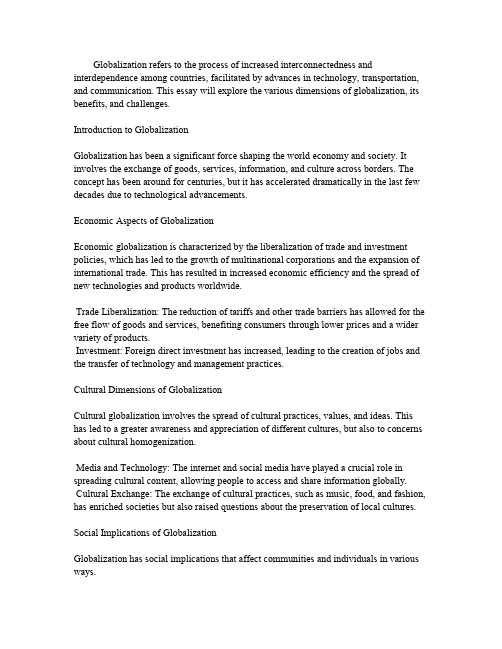
Globalization refers to the process of increased interconnectedness and interdependence among countries,facilitated by advances in technology,transportation, and communication.This essay will explore the various dimensions of globalization,its benefits,and challenges.Introduction to GlobalizationGlobalization has been a significant force shaping the world economy and society.It involves the exchange of goods,services,information,and culture across borders.The concept has been around for centuries,but it has accelerated dramatically in the last few decades due to technological advancements.Economic Aspects of GlobalizationEconomic globalization is characterized by the liberalization of trade and investment policies,which has led to the growth of multinational corporations and the expansion of international trade.This has resulted in increased economic efficiency and the spread of new technologies and products worldwide.Trade Liberalization:The reduction of tariffs and other trade barriers has allowed for the free flow of goods and services,benefiting consumers through lower prices and a wider variety of products.Investment:Foreign direct investment has increased,leading to the creation of jobs and the transfer of technology and management practices.Cultural Dimensions of GlobalizationCultural globalization involves the spread of cultural practices,values,and ideas.This has led to a greater awareness and appreciation of different cultures,but also to concerns about cultural homogenization.Media and Technology:The internet and social media have played a crucial role in spreading cultural content,allowing people to access and share information globally. Cultural Exchange:The exchange of cultural practices,such as music,food,and fashion, has enriched societies but also raised questions about the preservation of local cultures. Social Implications of GlobalizationGlobalization has social implications that affect communities and individuals in various ways.Migration:The ease of travel and the search for better opportunities have led to increased migration,which can strain social services and labor markets but also contribute to cultural diversity.Education:Access to global educational resources has improved,but disparities in access to quality education remain a concern.Environmental Impact of GlobalizationThe environmental impact of globalization is a critical concern,as increased production and consumption patterns have led to greater resource depletion and environmental degradation.Climate Change:The global nature of climate change requires international cooperation and has spurred discussions on sustainable development and green technologies. Resource Management:The demand for resources has increased,leading to issues such as deforestation and overfishing,which require global solutions.Challenges of GlobalizationWhile globalization offers many benefits,it also presents challenges that need to be addressed.Inequality:The benefits of globalization are not evenly distributed,leading to concerns about income inequality both within and between countries.Economic Instability:Global financial systems are more interconnected,which can lead to rapid spread of economic crises.ConclusionGlobalization is a complex and multifaceted phenomenon that has transformed the world in profound ways.It offers opportunities for economic growth,cultural exchange,and technological advancement,but also poses challenges that require thoughtful and collaborative solutions.As we move forward,it is essential to balance the benefits of globalization with the need to address its negative impacts,ensuring that it serves the interests of all people and the planet.。
Economic Globalization
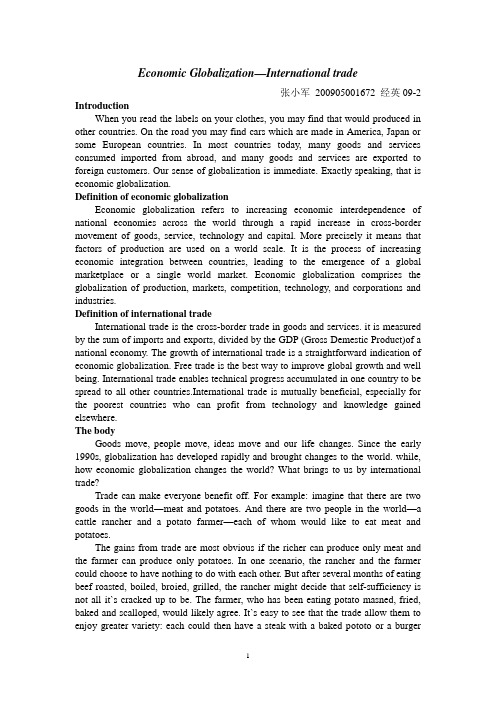
Economic Globalization—International trade张小军200905001672 经英09-2 IntroductionWhen you read the labels on your clothes, you may find that would produced in other countries. On the road you may find cars which are made in America, Japan or some European countries. In most countries today, many goods and services consumed imported from abroad, and many goods and services are exported to foreign customers. Our sense of globalization is immediate. Exactly speaking, that is economic globalization.Definition of economic globalizationEconomic globalization refers to increasing economic interdependence of national economies across the world through a rapid increase in cross-border movement of goods, service, technology and capital. More precisely it means that factors of production are used on a world scale. It is the process of increasing economic integration between countries, leading to the emergence of a global marketplace or a single world market. Economic globalization comprises the globalization of production, markets, competition, technology, and corporations and industries.Definition of international tradeInternational trade is the cross-border trade in goods and services. it is measured by the sum of imports and exports, divided by the GDP (Gross Demestic Product)of a national economy. The growth of international trade is a straightforward indication of economic globalization. Free trade is the best way to improve global growth and well being. International trade enables technical progress accumulated in one country to be spread to all other countries.International trade is mutually beneficial, especially for the poorest countries who can profit from technology and knowledge gained elsewhere.The bodyGoods move, people move, ideas move and our life changes. Since the early 1990s, globalization has developed rapidly and brought changes to the world. while, how economic globalization changes the world? What brings to us by international trade?Trade can make everyone benefit off. For example: imagine that there are two goods in the world―meat and potatoes. And there are two people in the world—a cattle rancher and a potato farmer—each of whom would like to eat meat and potatoes.The gains from trade are most obvious if the richer can produce only meat and the farmer can produce only potatoes. In one scenario, the rancher and the farmer could choose to have nothing to do with each other. But after several months of eating beef roasted, boiled, broied, grilled, the rancher might decide that self-sufficiency is not all it`s cracked up to be. The farmer, who has been eating potato masned, fried, baked and scalloped, would likely agree. It`s easy to see that the trade allow them to enjoy greater variety: each could then have a steak with a baked pototo or a burgerwith fries. In this case, the farmer and the rancher can each benefit by specializing in what he or she does best and then trading with the other.The moral of the story of the farmer and rancher should now be clear: trade can benefit everyone in society because it allows to special in which they have a comparative advantage.Advantages of international tradeInternational trade allows us to expand our markets for both goods and services that otherwise may not have been available to us. It is the reason why you can pick between a Japanese, German and American car. As a result of international trade, the market contains greater competition and therefore more competitive prices, which bring a cheaper product home to the consumer. Trading globally gives consumers and countries the opportunity to be exposed to goods and services not available in their own countries. Almost every kind of product can be found on the international market: food, clothes, spare parts, oil, jewelry, wine, stocks, currencies and water. Services are also traded: tourism, banking, consulting and transportation. Imports and exports are accounted for in a country's current account in the balance of payments.International trade not only results in increased efficiency but also allows countries to participate in a global economy, encouraging the opportunity of foreign direct investment (FDI), which is the amount of money that individuals invest into foreign companies and other assets. In theory, economies can therefore grow more efficiently and can more easily become competitive economic participants. ArgumentTrade destroys jobs in the industries that compete against imports. An industry vital to national security should be protected from foreign competition, to prevent dependence on imports that could be disrupted during war time. Producers argue their competitors in another country have an unfair advantage.World trade organization(WTO) which found in 1995, enforces trade arguments, resolves dispute in trading affairs, deals with the global rules of trade between nations. Its main function is to ensure that trade flows as smoothly, predictably and freely as possible.ConclusionEconomic globalizaton is already a reality, not a choice. It is something you have to live with, whether you like it or not. Globalization enhances the share of international exchanges in the world economy. Now we know that trading can make our life better and give us a chance to do what we are good at. To countries, international trade enhances the flow of ideas, facilitates the technology spread around the world. Even it is unfair and has its disadvantages, but actually, trading is processing all the time. While, the advantages of international trade is overweight its disadvantages.。
全球化对中国经济的影响英语作文
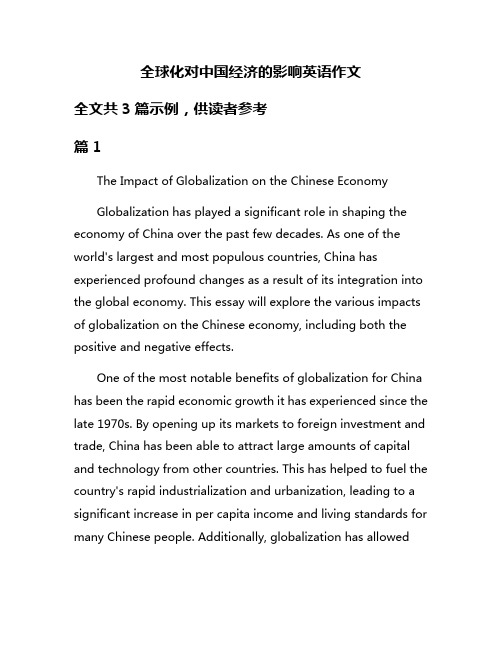
全球化对中国经济的影响英语作文全文共3篇示例,供读者参考篇1The Impact of Globalization on the Chinese EconomyGlobalization has played a significant role in shaping the economy of China over the past few decades. As one of the world's largest and most populous countries, China has experienced profound changes as a result of its integration into the global economy. This essay will explore the various impacts of globalization on the Chinese economy, including both the positive and negative effects.One of the most notable benefits of globalization for China has been the rapid economic growth it has experienced since the late 1970s. By opening up its markets to foreign investment and trade, China has been able to attract large amounts of capital and technology from other countries. This has helped to fuel the country's rapid industrialization and urbanization, leading to a significant increase in per capita income and living standards for many Chinese people. Additionally, globalization has allowedChinese companies to expand their operations overseas, giving them access to new markets and customers.Another positive impact of globalization on the Chinese economy has been the increase in foreign direct investment (FDI) flowing into the country. This has helped to create jobs, stimulate economic development, and improve infrastructure in China. Foreign companies investing in China have also brought with them valuable knowledge and expertise, helping to improve the competitiveness of Chinese industries. Furthermore, globalization has facilitated the transfer of technology and skills between countries, leading to advancements in various sectors of the Chinese economy.However, globalization has also brought challenges and risks to the Chinese economy. One of the major concerns is the issue of income inequality, as globalization has led to disparities in wealth distribution between different regions and social groups in China. The rapid pace of economic growth and industrialization has also had negative environmental consequences, such as pollution and resource depletion. Additionally, China's heavy reliance on exports has made its economy vulnerable to fluctuations in the global market, as seen during the global financial crisis of 2008.Despite these challenges, China has shown resilience and adaptability in responding to the impacts of globalization. The Chinese government has implemented various policies to address issues such as income inequality, environmental degradation, and economic instability. For example, it has introduced measures to promote sustainable development, increase social welfare, and reduce the country's dependence on exports. China has also actively participated in international trade agreements and organizations, such as the World Trade Organization (WTO), to promote a more open and inclusive global economy.In conclusion, globalization has had a profound impact on the Chinese economy, contributing to its rapid growth and development over the past few decades. While there have been challenges and risks associated with globalization, China has shown resilience and adaptability in responding to these issues. By embracing the opportunities and overcoming the challenges of globalization, China will continue to play a key role in the global economy in the future.篇2Globalization has had a significant impact on the Chinese economy in recent years. As China has increasingly becomeintegrated into the global economy, it has experienced both opportunities and challenges. In this essay, we will explore the various ways in which globalization has influenced the Chinese economy.One of the most obvious effects of globalization on the Chinese economy is the increase in trade and investment flows. China has become one of the world's largest exporters and attracts a significant amount of foreign direct investment. This has contributed to China's rapid economic growth over the past few decades. The country has also become an important player in the global supply chain, with many multinational corporations relying on Chinese manufacturing and production facilities.Globalization has also led to the transfer of technology and knowledge to China. Foreign companies operating in China often bring with them advanced technologies and management practices. This has helped to improve the efficiency and productivity of Chinese firms, leading to increased competitiveness in the global market. At the same time, Chinese companies have also been able to expand overseas, acquiring foreign technologies and expertise through mergers and acquisitions.However, globalization has not been without its challenges for the Chinese economy. The increased competition from foreign firms has put pressure on domestic industries, leading to job losses and restructuring. In addition, China's reliance on exporting has made its economy vulnerable to external shocks, such as changes in global demand or trade policies. The country's large trade surplus has also led to tensions with other countries, particularly the United States.Another consequence of globalization is the widening income inequality in China. While some regions and sectors have benefited greatly from increased trade and investment, others have been left behind. Rural areas and smaller cities have struggled to keep up with the pace of economic development, leading to a growing urban-rural wealth gap. This has raised concerns about social stability and the sustainability of China's growth model.In response to these challenges, the Chinese government has implemented various policies to promote sustainable development and address the negative impacts of globalization. This includes initiatives to upgrade industries, boost innovation, and promote domestic consumption. China has also beenactively seeking to diversify its trading partners and reduce its dependence on any single market.Overall, the impact of globalization on the Chinese economy has been mixed. While it has brought about unprecedented economic growth and development, it has also presented a range of challenges. China will need to continue to adapt to the changing global landscape and implement reforms to ensure that it can continue to benefit from globalization in the long run.篇3The Impact of Globalization on the Chinese EconomyIntroductionGlobalization has become a prominent force shaping the world economy in recent decades. In the case of China, the process of globalization has had a profound impact on its economy, transforming it from a closed and centrally planned system to one that is increasingly integrated into the global economy. This essay will explore the various ways in which globalization has influenced the Chinese economy, and the challenges and opportunities that it presents.Impact on TradeOne of the most significant effects of globalization on the Chinese economy has been the rapid expansion of its trade relationships with the rest of the world. China has leveraged its large supply of cheap labor to become the world's factory, attracting investment from multinational corporations and becoming a major exporter of manufactured goods. This has enabled China to achieve high rates of economic growth and develop a large trade surplus.However, this reliance on exports also makes China vulnerable to external economic shocks, such as the global financial crisis of 2008. The crisis caused a sharp decline in demand for Chinese exports, leading to a slump in economic growth. To mitigate this risk, China has sought to diversify its trade relationships by expanding into new markets such as Africa and Latin America.Impact on Foreign Direct InvestmentGlobalization has also brought a surge of foreign direct investment (FDI) into China, fueling its economic development and modernization. Multinational corporations are drawn to China's large consumer market, skilled workforce, and improving business environment. The influx of FDI has contributed to thegrowth of China's manufacturing sector, infrastructure development, and technology transfer.At the same time, China faces challenges in managing the inflow of FDI, such as concerns over intellectual property theft, unequal market access, and competition with domestic firms. To address these issues, China has implemented policies to promote indigenous innovation, protect intellectual property rights, and encourage domestic firms to become more competitive.Impact on Technology and InnovationGlobalization has accelerated China's technological development and innovation capabilities, as it has benefited from the transfer of technology and expertise from foreign firms. China has made significant progress in areas such as telecommunications, high-speed rail, and renewable energy, and has become a global leader in e-commerce and digital payment systems.Despite these achievements, China still lags behind advanced economies in terms of indigenous innovation and cutting-edge technologies. To address this gap, the Chinese government has launched initiatives such as Made in China 2025and the Belt and Road Initiative to promote technological upgrading and cooperation with other countries.Impact on Economic ReformGlobalization has played a key role in driving economic reform in China, as it has exposed the inefficiencies of thestate-owned enterprises and the need for market-oriented policies. China has gradually liberalized its economy by reducing trade barriers, opening up to foreign investment, and promoting private entrepreneurship.However, China still faces challenges in reforming its financial sector, addressing income inequality, and reducing overcapacity in industries such as steel and coal. The government is pursuing structural reforms to rebalance the economy towards consumption and services, while ensuring sustainable and inclusive growth.ConclusionIn conclusion, globalization has had a profound impact on the Chinese economy, transforming it into a major player in the global marketplace. While China has benefited from the opportunities presented by globalization, it also faces challenges in managing its trade relationships, attracting foreign investment,promoting technological innovation, and implementing economic reform. By embracing the opportunities and addressing the challenges of globalization, China can continue to prosper and contribute to the development of the global economy.。
globalization

The definition of culture
Social and historical development of mankind in the process of creation of material wealth and spiritual wealth. 人类在社会历史发展过程中所创造的物 质财富和精神财富的总和。
1. one view does not exist" globalization of culture ", " cultural globalization "to" globalization "concept of universal; 2. globalization "is" cultural
流动,经历了跨国化、局部的国际化以及全球 化这几个发展阶段。货物与资本的跨国流动是 全球化的最初形态。在此过程中,出现了相应
的地区性、国际性的经济管理组织与经济实体, 以及文化、生活方式、价值观念、意识形态等 精神力量的跨国交流、碰撞、冲突与融合。
Developing Process
Globalization is in the world scope since 1980s emerging new phenomenon, is the basic characteristic of the times. Generally speaking, from the material form, globalization refers to the
The benefits of globalization is not universal. The rich are getting richer
经济全球化的好处和坏处英语作文
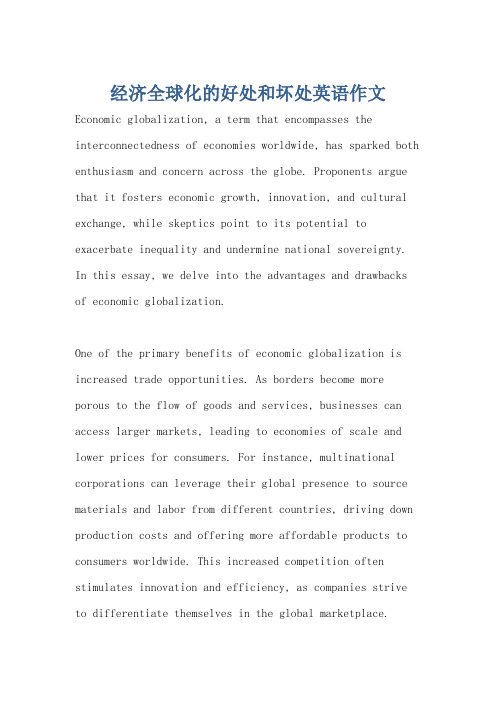
经济全球化的好处和坏处英语作文Economic globalization, a term that encompasses the interconnectedness of economies worldwide, has sparked both enthusiasm and concern across the globe. Proponents argue that it fosters economic growth, innovation, and cultural exchange, while skeptics point to its potential to exacerbate inequality and undermine national sovereignty. In this essay, we delve into the advantages and drawbacks of economic globalization.One of the primary benefits of economic globalization is increased trade opportunities. As borders become more porous to the flow of goods and services, businesses can access larger markets, leading to economies of scale and lower prices for consumers. For instance, multinational corporations can leverage their global presence to source materials and labor from different countries, driving down production costs and offering more affordable products to consumers worldwide. This increased competition often stimulates innovation and efficiency, as companies strive to differentiate themselves in the global marketplace.Moreover, economic globalization facilitates the dissemination of knowledge and technology across borders. Through international collaborations and investments, countries can harness the expertise and resources of others to spur technological advancements and address common challenges such as climate change and public health crises. For example, initiatives like the Paris Agreement on climate change and the World Health Organization's efforts to combat pandemics rely on global cooperation and information sharing to achieve meaningful impact.Furthermore, economic globalization has contributed to the spread of cultural exchange and diversity. As people and ideas traverse national boundaries, societies become more interconnected and enriched by diverse perspectives and experiences. Cultural exchange fosters tolerance and understanding, breaking down stereotypes and prejudicesthat hinder social cohesion. For instance, the popularity of international cuisine, music, and fashion reflects the blending of cultures in an increasingly interconnected world, fostering a sense of global citizenship andsolidarity.However, alongside these benefits, economic globalization also poses significant challenges and risks. One of the most pressing concerns is its potential to exacerbate income inequality within and between countries. While globalization has lifted many out of poverty, it has also widened the gap between the rich and the poor, as those with access to capital and technology benefit disproportionately from global economic integration. Moreover, the outsourcing of jobs to countries with lower labor costs has led to job displacement and wage stagnation in developed economies, fueling resentment and social unrest.Additionally, economic globalization has raised concerns about its impact on environmental sustainability. The pursuit of economic growth often comes at the expense of environmental degradation, as industries exploit natural resources and pollute ecosystems in the pursuit of profit. Global supply chains can also lead to increased carbon emissions and waste generation, exacerbating climate changeand biodiversity loss. Despite efforts to promote sustainable development and corporate responsibility, the relentless pursuit of economic growth in a globalized world poses significant challenges to environmental conservation and resource management.Furthermore, economic globalization has raised questions about its implications for national sovereignty and democratic governance. As multinational corporations wield increasing influence over global markets and policymakers, there is a risk of regulatory capture and erosion of democratic accountability. Moreover, the rise of supranational organizations and trade agreements can constrain the ability of governments to enact policies in the interest of their citizens, leading to concerns about loss of control and sovereignty.In conclusion, economic globalization presents a complex array of benefits and drawbacks that have profound implications for societies worldwide. While it offers opportunities for economic growth, innovation, and cultural exchange, it also raises concerns about inequality,environmental sustainability, and democratic governance. As we navigate an increasingly interconnected world, it is essential to strike a balance between harnessing the benefits of globalization and addressing its challenges to ensure a more equitable, sustainable, and inclusive future for all.。
经济全球化的影响英语作文
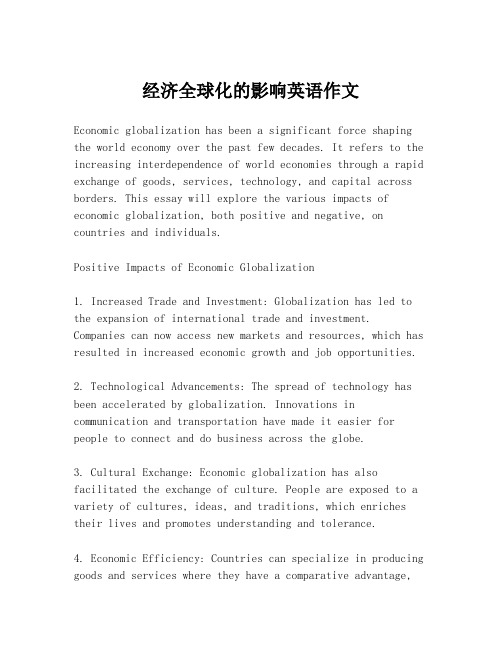
经济全球化的影响英语作文Economic globalization has been a significant force shaping the world economy over the past few decades. It refers to the increasing interdependence of world economies through a rapid exchange of goods, services, technology, and capital across borders. This essay will explore the various impacts of economic globalization, both positive and negative, on countries and individuals.Positive Impacts of Economic Globalization1. Increased Trade and Investment: Globalization has led to the expansion of international trade and investment. Companies can now access new markets and resources, which has resulted in increased economic growth and job opportunities.2. Technological Advancements: The spread of technology has been accelerated by globalization. Innovations in communication and transportation have made it easier for people to connect and do business across the globe.3. Cultural Exchange: Economic globalization has also facilitated the exchange of culture. People are exposed to a variety of cultures, ideas, and traditions, which enriches their lives and promotes understanding and tolerance.4. Economic Efficiency: Countries can specialize in producing goods and services where they have a comparative advantage,leading to more efficient use of resources and lower costsfor consumers.Negative Impacts of Economic Globalization1. Job Displacement: While globalization creates jobs in some sectors, it can also lead to job losses in others,particularly in industries that are unable to compete with cheaper labor in other countries.2. Inequality: The benefits of globalization are not evenly distributed. Wealthier countries and individuals oftenbenefit more than poorer ones, leading to increased economic disparities both within and between countries.3. Environmental Concerns: Rapid industrialization and increased consumption associated with globalization can lead to environmental degradation, including pollution, deforestation, and climate change.4. Cultural Homogenization: The spread of global culture can sometimes lead to the loss of local cultures and traditions, as global brands and media dominate local markets.ConclusionEconomic globalization is a complex phenomenon with far-reaching implications. While it has the potential to drive economic growth and improve living standards, it also presents challenges that need to be managed carefully. Policymakers, businesses, and individuals must work togetherto ensure that globalization benefits all members of society and is sustainable in the long term. By doing so, we can harness the power of globalization to create a more prosperous and interconnected world.。
经济全球化弊端中英对照
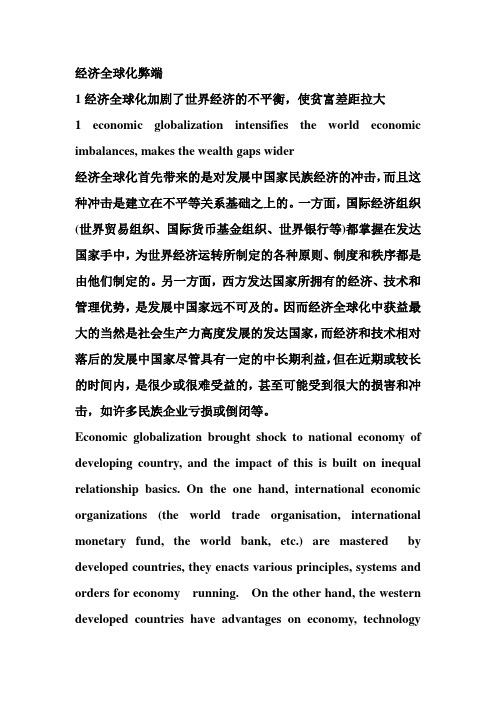
经济全球化弊端1经济全球化加剧了世界经济的不平衡,使贫富差距拉大1 economic globalization intensifies the world economic imbalances, makes the wealth gaps wider经济全球化首先带来的是对发展中国家民族经济的冲击,而且这种冲击是建立在不平等关系基础之上的。
一方面,国际经济组织(世界贸易组织、国际货币基金组织、世界银行等)都掌握在发达国家手中,为世界经济运转所制定的各种原则、制度和秩序都是由他们制定的。
另一方面,西方发达国家所拥有的经济、技术和管理优势,是发展中国家远不可及的。
因而经济全球化中获益最大的当然是社会生产力高度发展的发达国家,而经济和技术相对落后的发展中国家尽管具有一定的中长期利益,但在近期或较长的时间内,是很少或很难受益的,甚至可能受到很大的损害和冲击,如许多民族企业亏损或倒闭等。
Economic globalization brought shock to national economy of developing country, and the impact of this is built on inequal relationship basics. On the one hand, international economic organizations (the world trade organisation, international monetary fund, the world bank, etc.) are mastered by developed countries, they enacts various principles, systems and orders for economy running. On the other hand, the western developed countries have advantages on economy, technologyand management, in which the developing country is left far behind. So the economic globalization benefited the social productivity high developed countries , while despite the certain long-term interests,the economic and technical relatively backward developing countries is seldom or difficult to be benefited in the near future or longer time.they even may suffer a lot of damages such as many national enterprise was bankrupt.,竞争,创造高效率的同时,必然导致财富越来越向少数国家或利益集团集中,导致贫富差距的扩大。
Globalization and Economic Growth
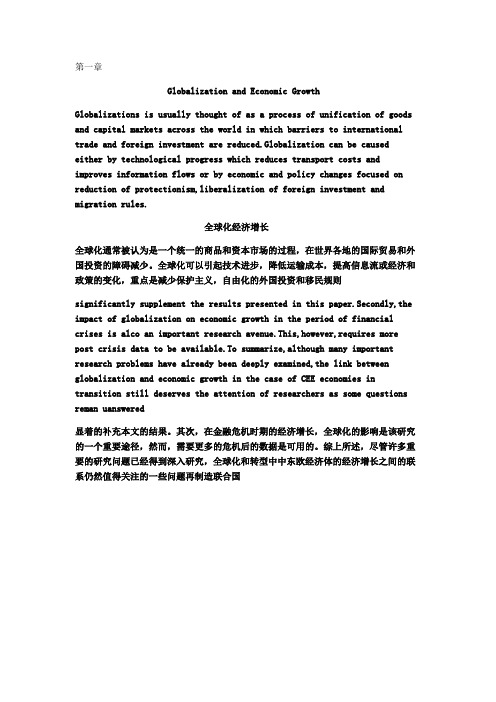
第一章Globalization and Economic GrowthGlobalizations is usually thought of as a process of unification of goods and capital markets across the world in which barriers to international trade and foreign investment are reduced.Globalization can be caused either by technological progress which reduces transport costs and improves information flows or by economic and policy changes focused on reduction of protectionism,liberalization of foreign investment and migration rules.全球化经济增长全球化通常被认为是一个统一的商品和资本市场的过程,在世界各地的国际贸易和外国投资的障碍减少。
全球化可以引起技术进步,降低运输成本,提高信息流或经济和政策的变化,重点是减少保护主义,自由化的外国投资和移民规则significantly supplement the results presented in this paper.Secondly,the impact of globalization on economic growth in the period of financial crises is alco an important research avenue.This,however,requires more post crisis data to be available.To summarize,although many important research problems have already been deeply examined,the link between globalization and economic growth in the case of CEE economies in transition still deserves the attention of researchers as some questions reman uanswered显着的补充本文的结果。
economy globalization
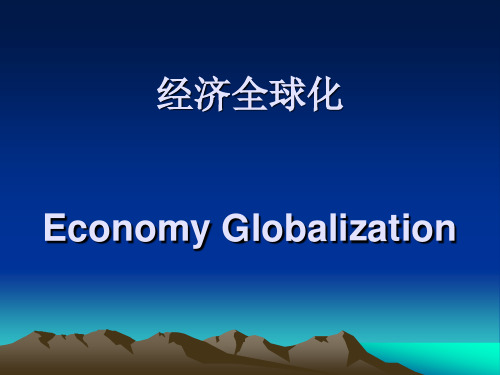
以上就是我的作品, 谢谢观赏!
经济全球化
Economy Globalization
经济全球化是指生产要素跨越国界,在全球范围内自由 流动,各国、各地区相互融合成整体的历史过程。经济全球化是在 特定的历史条件下产生和发展的一种潮流和趋势,经济全球化是一 把“双刃剑”,既给中国带来了机遇,同时又给中国带来了挑战。 中国经济在如此的大潮中将如何发展已经成为人们共同关注的热点 话题了。 Economic globalization refers to factors of production across national boundaries, the global free movement of all countries and regions into the overall integration of the historical process. Economic globalization is a specific historical conditions of emergence and development of a trend and the trend of economic globalization is a "double-edged sword," not only brought opportunities to China, while China has also brought challenges. China's economy will be in such a tide of development has become a hot topic of common concern .
For Chinese enterprises, on the one hand, economic globalization will bring more intense competition, on the other hand, it may provide a broader space for development. It’s beneficial for Chinese enterprises to go out , making full use of two resources and two markets for multinational operations. It can be said that even though China now still lack of numerous international competitiveness , the road to explore thewise choice. In particular,Haier group has developed "from the internationalization of Haier to the international Haier" . This kind of development opened up a unique path of transnational business and became a transnational operations of Chinese enterprises to prove the best prospects. However, the nurture and development of China’s transnational corporations can not take the traditional path of the operation of transnational corporations, we must make use of the knowledge management, the idea of "advantages" of the development by leaps and bounds , and enhance international competitiveness.
Globalization of economy
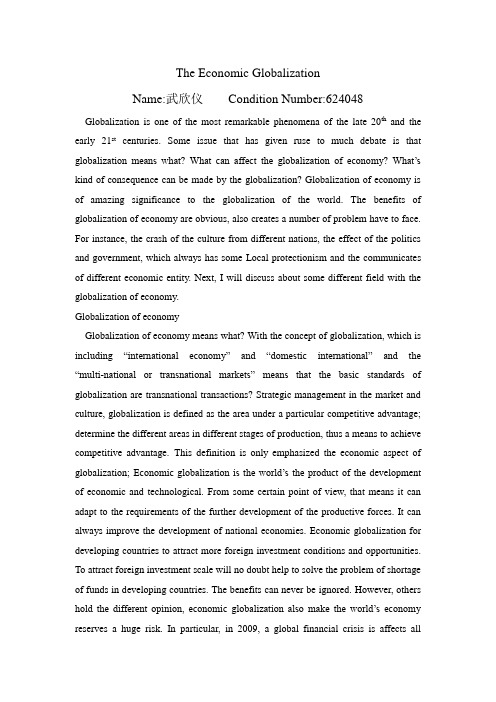
The Economic GlobalizationName:武欣仪Condition Number:624048 Globalization is one of the most remarkable phenomena of the late 20th and the early 21st centuries. Some issue that has given ruse to much debate is that globalization means what? What can affect the globalization of economy? What’s kind of consequence can be made by the globalization? Globalization of economy is of amazing significance to the globalization of the world. The benefits of globalization of economy are obvious, also creates a number of problem have to face. For instance, the crash of the culture from different nations, the effect of the politics and government, which always has some Local protectionism and the communicates of different economic entity. Next, I will discuss about some different field with the globalization of economy.Globalization of economyGlobalization of economy means what? With the concept of globalization, which is including “international economy” and “domestic international” and the “multi-national or transnational markets” means that the basic standards of globalization are transnational transactions? Strategic management in the market and culture, globalization is defined as the area under a particular competitive advantage; determine the different areas in different stages of production, thus a means to achieve competitive advantage. This definition is only emphasized the economic aspect of globalization; Economic globalization is the world’s the product of the development of economic and technological. From some certain point of view, that means it can adapt to the requirements of the further development of the productive forces. It can always improve the development of national economies. Economic globalization for developing countries to attract more foreign investment conditions and opportunities. To attract foreign investment scale will no doubt help to solve the problem of shortage of funds in developing countries. The benefits can never be ignored. However, others hold the different opinion, economic globalization also make the world’s economy reserves a huge risk. In particular, in 2009, a global financial crisis is affects allaround the world. This disaster outbreak in USA, and quickly spread all over the world. At that time, countries which has high dependence on foreign trade, especially in the countries that industrial chain has had close contact with the outside countries has the largest turbulence. Therefore, the United States, Britain, France, Germany and some other developed countries has the most affect. Economic aspects of globalization from the expansion of the capitalist world economy and the expansion of products and services. For cheap raw materials, labor and new market needs, makes the capitalist world from the first Euro-centric and extended to the whole world. This process is accomplished through a variety of ways and often involves overcoming the political obstacles to get new markets.Culture and the globalization of economyCulture is the spirit of a nation. Broader definition of globalization in sociology and anthropology and other disciplines to find. Apparently, Social, cultural and political factors only in the context of access to economic advantage was taken into account. Therefore, in the globalized economy of the "cultural sensitivity" is to put the country's products in a way of originality sold at the same time to avoid unfamiliar with local customs may encounter risks. Textbook on international markets and cultural risk in such detail, but the global cultural competition is always subject to economic constraints. The crash of culture from different countries is always passionate. An obvious example for the crash; as we know, English study play a significance role in Chinese student’s daily life. Not only for the students, also for everyone who wants to have a great career. Gradually, in order to enter a better university or get a high income, Chinese people pay more attention to learning English. Chinese has successful hold the Olympic Games in 2008, which is one of the world’s most successful Olympic Games so far. For this grandly party, Chinese has do their effort to get ready to welcome the people all around the world, which is including everyone could speaking English fluently. As a result, there is less time and less space for Chinese. These situations provoked a strong reaction of some experts of Sinology. They ran and advocacy everywhere and every time, they believe that it’s one kinds of cultural invasion. ”we have experience aggression by other nations, wehave experience the war, based on such ruins, we still stand here, but nowadays we are losing our civilization and language.” said Zhao Chao , a famous linguist of Peking university.Political and economic globalizationFurthermore, the process of accomplished through a variety of ways and often involves overcoming the political obstacles to new markets. Political aspects of globalization mainly through the direct use of military force to control the new market, or the establishment of international institutions, to achieve the new markets and raw materials control. The rise of the nation-state is an example of globalization at the political level, despite that the telecommunications, information systems development and beyond the territorial boundaries of the institution-building to nation-state is obsolete. If the global economic and political dimensions involved in the exchange of material and power, then the cultural dimension of globalization is the fact that those representatives, meaning, beliefs, preferences, tastes and values of symbolic expression. In fact, the spread of global mass culture, these symbolic exchanges is increasingly replaced by economic and political exchange. The traditional language barriers such as satellite TV. Movies and other modern means of cultural products do not create any trouble. However, the new "global culture", although advertised consumer products around the world and representing different regions of the symbolism, but its essence is a large country as the center of Western culture. They use their power and alliance to press developing countries and the third world countries. That’s kind of economic globalizat ion making the leverage of economic unfair; they always can take the better terrain in trade.For summary, I always definition the economic globalization as "a social process, in the meantime, social and cultural geographic limitations in reducing the same time, more and more people are aware of this limitation is reduced." This broader the definition allows us to examine some of the consequences of globalization, not only economic aspects, including social, cultural and political caving. These factors affect the economic globalization at the same time.。
经济全球化(economic globalization )
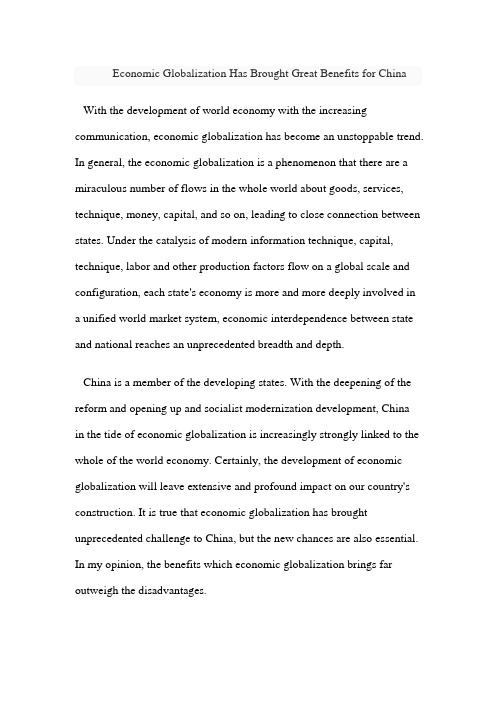
Economic Globalization Has Brought Great Benefits for China With the development of world economy with the increasing communication, economic globalization has become an unstoppable trend. In general, the economic globalization is a phenomenon that there are a miraculous number of flows in the whole world about goods, services, technique, money, capital, and so on, leading to close connection between states. Under the catalysis of modern information technique, capital, technique, labor and other production factors flow on a global scale and configuration, each state's economy is more and more deeply involved in a unified world market system, economic interdependence between state and national reaches an unprecedented breadth and depth.China is a member of the developing states. With the deepening of the reform and opening up and socialist modernization development, Chinain the tide of economic globalization is increasingly strongly linked to the whole of the world economy. Certainly, the development of economic globalization will leave extensive and profound impact on our country's construction. It is true that economic globalization has brought unprecedented challenge to China, but the new chances are also essential. In my opinion, the benefits which economic globalization brings far outweigh the disadvantages.Economic globalization can help to attract foreign capital. For western developed countries, the development of China provides a huge market to them. At present, our state has become one of the biggest foreign direct investors in the world, and is basically a net inflow of capital. As revealed by a research, from 1979 to the end of 1999, the actual use of foreign capital in our state is $459.56 billion in, including direct investment of $305.92 billion from foreigners. The amount of foreign-funded enterprises reaches 0.212 millions. Stock of foreign direct investment in China's share of gross domestic product has more than 20%. Introduction of the large amount of foreign capital has great contribution to meet the demand of domestic capital, to some extent compensating for urgent needs of money for the modernization construction in China, promoting the development of industrial structure and the improvement of productivity. At the same time in attracting foreign investment, we also introduce some advanced techniques and management experience which has played a positive role to our state modernization.The ministry of foreign trade in China expands unceasingly due to the economic globalization. After more than 20 years of efforts, China's foreign economic trade has become an important economic growth point. In terms of foreign trade, China's imports and exports increased from $20.6 billion in 1978 to $1.15 trillion in2004, the average annual growth of 16.7%, in 2005 to $1.42212 trillion. According to the data provided byCustoms, bilateral trade volume between China and the top six largest trading partners are more than one hundred billion dollars. In recent years, foreign trade part accounts for about two percent in China's GDP growth. That is to say, about a quarter of the amount of the economic growth each year is to rely on foreign trade. The growth of foreign trade can expand the market for domestic producers to promote the development of productive forces; can accumulate the necessary funds for economic growth; and promote technological innovation and institutional introduction. Under the policy of opening to the outside world, China's foreign economic and trade scale expands unceasingly, which promoting a boom of economy.The development of economic globalization is beneficial to absorb rural surplus labor force. By far, from the point of per capita economy, our state is still a relatively backward country. In an effort to realize the process of industrialization, huge rural population and the surplus labor force are always a problem remaining to be solved. Nevertheless the development of economic globalization provides chances to the transferof rural labor in our state. By 1999, labor force that the foreign-invested enterprises absorbed is more than 6 million. The foreign trade processing belt throughout the southeast coastal area, absorbed nearly two hundred million rural labor forces. Solving the problem of the rural labor force can contribute to expanding rural industrialization and urbanization in Chinato a certain extent, as well as help solve the "three rural" issue, effectively increasing the farmers' income and promoting rural economic development. Farmers working outside bring back to capital, technology and management experiences, also bringing back a new way of getting money, which will make more farmers out of poverty and create conditions for the early arrival of well-off society in rural China.Although the economic globalization has brought us some chances, it has brought more opportunities and benefits. We should fully recognize and take advantage of these chances, in order to make our state better.。
经济全球化带来的影响,英语作文
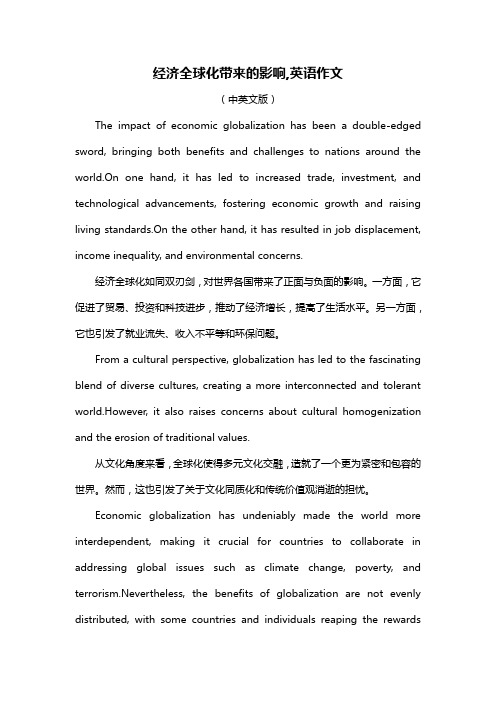
经济全球化带来的影响,英语作文(中英文版)The impact of economic globalization has been a double-edged sword, bringing both benefits and challenges to nations around the world.On one hand, it has led to increased trade, investment, and technological advancements, fostering economic growth and raising living standards.On the other hand, it has resulted in job displacement, income inequality, and environmental concerns.经济全球化如同双刃剑,对世界各国带来了正面与负面的影响。
一方面,它促进了贸易、投资和科技进步,推动了经济增长,提高了生活水平。
另一方面,它也引发了就业流失、收入不平等和环保问题。
From a cultural perspective, globalization has led to the fascinating blend of diverse cultures, creating a more interconnected and tolerant world.However, it also raises concerns about cultural homogenization and the erosion of traditional values.从文化角度来看,全球化使得多元文化交融,造就了一个更为紧密和包容的世界。
然而,这也引发了关于文化同质化和传统价值观消逝的担忧。
Economic globalization has undeniably made the world more interdependent, making it crucial for countries to collaborate in addressing global issues such as climate change, poverty, and terrorism.Nevertheless, the benefits of globalization are not evenly distributed, with some countries and individuals reaping the rewardsmore than others.经济全球化无疑使世界变得更加相互依存,各国在应对气候变化、贫困和恐怖主义等全球性问题时,加强合作显得尤为重要。
经济全球化带来的影响,英语作文
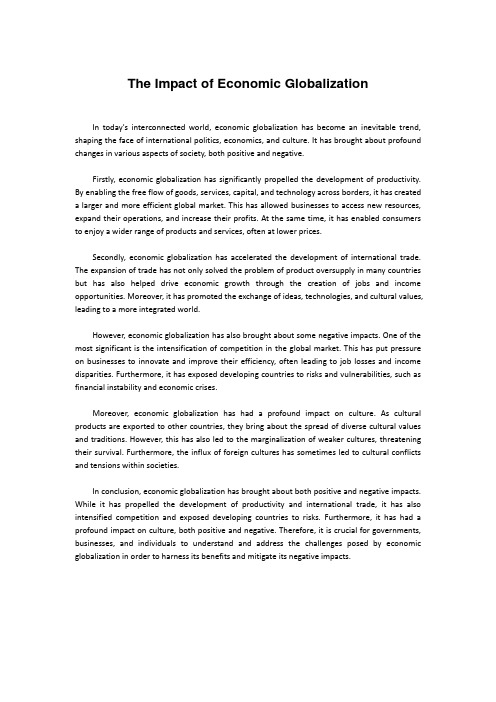
The Impact of Economic GlobalizationIn today's interconnected world, economic globalization has become an inevitable trend, shaping the face of international politics, economics, and culture. It has brought about profound changes in various aspects of society, both positive and negative.Firstly, economic globalization has significantly propelled the development of productivity. By enabling the free flow of goods, services, capital, and technology across borders, it has created a larger and more efficient global market. This has allowed businesses to access new resources, expand their operations, and increase their profits. At the same time, it has enabled consumers to enjoy a wider range of products and services, often at lower prices.Secondly, economic globalization has accelerated the development of international trade. The expansion of trade has not only solved the problem of product oversupply in many countries but has also helped drive economic growth through the creation of jobs and income opportunities. Moreover, it has promoted the exchange of ideas, technologies, and cultural values, leading to a more integrated world.However, economic globalization has also brought about some negative impacts. One of the most significant is the intensification of competition in the global market. This has put pressure on businesses to innovate and improve their efficiency, often leading to job losses and income disparities. Furthermore, it has exposed developing countries to risks and vulnerabilities, such as financial instability and economic crises.Moreover, economic globalization has had a profound impact on culture. As cultural products are exported to other countries, they bring about the spread of diverse cultural values and traditions. However, this has also led to the marginalization of weaker cultures, threatening their survival. Furthermore, the influx of foreign cultures has sometimes led to cultural conflicts and tensions within societies.In conclusion, economic globalization has brought about both positive and negative impacts. While it has propelled the development of productivity and international trade, it has also intensified competition and exposed developing countries to risks. Furthermore, it has had a profound impact on culture, both positive and negative. Therefore, it is crucial for governments, businesses, and individuals to understand and address the challenges posed by economic globalization in order to harness its benefits and mitigate its negative impacts.。
全球化的利与弊Economicglobalization英汉
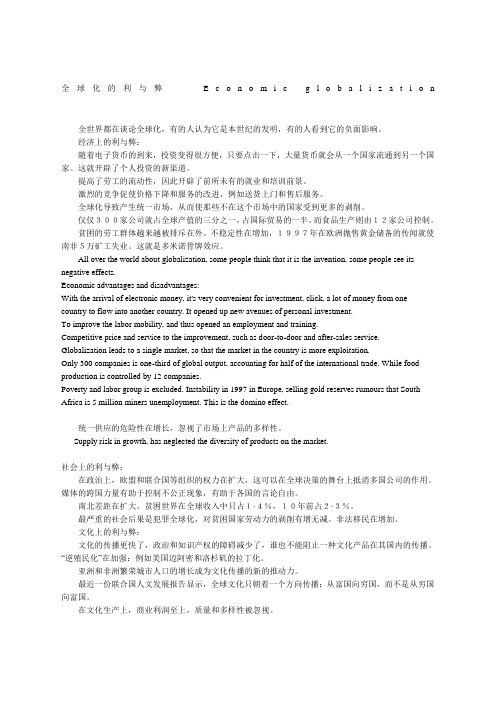
全球化的利与弊E c o n o m i c g l o b a l i z a t i o n全世界都在谈论全球化,有的人认为它是本世纪的发明,有的人看到它的负面影响。
经济上的利与弊:随着电子货币的到来,投资变得很方便,只要点击一下,大量货币就会从一个国家流通到另一个国家。
这就开辟了个人投资的新渠道。
提高了劳工的流动性,因此开辟了前所未有的就业和培训前景。
激烈的竞争促使价格下降和服务的改进,例如送货上门和售后服务。
全球化导致产生统一市场,从而使那些不在这个市场中的国家受到更多的剥削。
仅仅300家公司就占全球产值的三分之一,占国际贸易的一半。
而食品生产则由12家公司控制。
贫困的劳工群体越来越被排斥在外。
不稳定性在增加,1997年在欧洲抛售黄金储备的传闻就使南非5万矿工失业。
这就是多米诺骨牌效应。
All over the world about globalization, some people think that it is the invention, some people see its negative effects.Economic advantages and disadvantages:With the arrival of electronic money, it's very convenient for investment, click, a lot of money from one country to flow into another country. It opened up new avenues of personal investment.To improve the labor mobility, and thus opened an employment and training.Competitive price and service to the improvement, such as door-to-door and after-sales service. Globalization leads to a single market, so that the market in the country is more exploitation.Only 300 companies is one-third of global output, accounting for half of the international trade. While food production is controlled by 12 companies.Poverty and labor group is excluded. Instability in 1997 in Europe, selling gold reserves rumours that South Africa is 5 million miners unemployment. This is the domino effect.统一供应的危险性在增长,忽视了市场上产品的多样性。
The impact of globalization on the economy
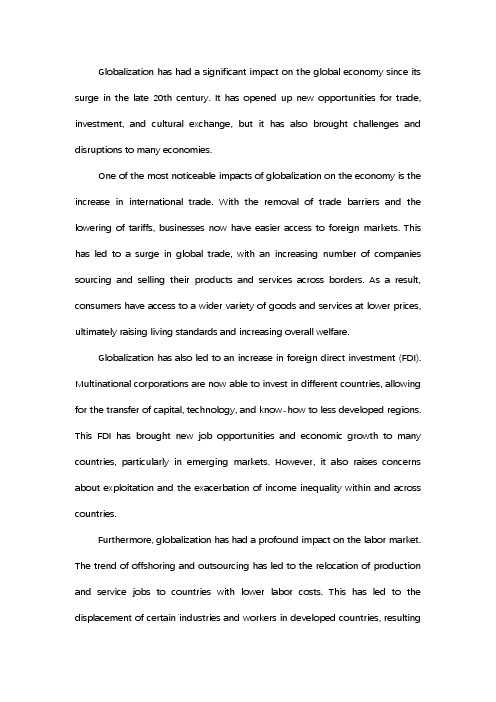
Globalization has had a significant impact on the global economy since its surge in the late 20th century. It has opened up new opportunities for trade, investment, and cultural exchange, but it has also brought challenges and disruptions to many economies.One of the most noticeable impacts of globalization on the economy is the increase in international trade. With the removal of trade barriers and the lowering of tariffs, businesses now have easier access to foreign markets. This has led to a surge in global trade, with an increasing number of companies sourcing and selling their products and services across borders. As a result, consumers have access to a wider variety of goods and services at lower prices, ultimately raising living standards and increasing overall welfare.Globalization has also led to an increase in foreign direct investment (FDI). Multinational corporations are now able to invest in different countries, allowing for the transfer of capital, technology, and know-how to less developed regions. This FDI has brought new job opportunities and economic growth to many countries, particularly in emerging markets. However, it also raises concerns about exploitation and the exacerbation of income inequality within and across countries.Furthermore, globalization has had a profound impact on the labor market. The trend of offshoring and outsourcing has led to the relocation of production and service jobs to countries with lower labor costs. This has led to the displacement of certain industries and workers in developed countries, resultingin job losses and wage stagnation. On the other hand, it has improved job opportunities and living standard for workers in developing countries.In addition, globalization has facilitated the spread of technology and innovation across countries. Companies gain access to the latest technologies from around the world and can quickly adopt and implement them in their operations. This has led to increased productivity and competitiveness in many industries, strengthening the global economy as a whole.However, the impact of globalization is not universally positive. It has also led to the increased interconnectedness of the global financial system, resulting in heightened vulnerability to financial crises. The 2008 global financial crisis, for example, spread rapidly across countries, causing severe economic downturns worldwide. In addition, the increased mobility of capital has made it easier for speculative investors to create financial instability through rapid capital flows in and out of emerging markets.Moreover, globalization has raised concerns over the environmental implications of increased production and trade. The rise in global transportation and the expansion of industrial production have contributed to higher energy consumption, greenhouse gas emissions, and environmental degradation.Finally, globalization has raised concerns about the erosion of national sovereignty. The harmonization of economic policies and regulations, as well as the rise of international trade agreements, has led to an increased transfer of authority from national governments to supranational bodies and multinationalcorporations.In conclusion, the impact of globalization on the global economy has been profound and multifaceted. While it has brought about new opportunities for growth and development, it has also created challenges and disruptions that must be carefully managed. As globalization continues to evolve, policymakers and businesses will need to address its impact on employment, inequality, the environment, and financial stability to ensure a more balanced and sustainable global economy.。
经济类英语作文

经济类英语作文In the era of globalization, economies around the world are more interconnected than ever before. This essay will explore the multifaceted impact of globalization on local economies, highlighting both the opportunities and challenges it presents.Firstly, globalization has led to an increase ininternational trade. The reduction of trade barriers has allowed local businesses to access global markets, which can lead to increased sales and growth. For example, small-scale producers in developing countries can now sell their products to consumers worldwide, improving their economic prospects.However, globalization also brings competition. Local industries may struggle to compete with larger, more established multinational corporations. This can lead to job losses and economic decline in certain sectors, as seen in the textile industry in many countries after theliberalization of trade.Another significant impact of globalization is the flow of capital. Foreign direct investment can provide much-needed capital for development projects, creating jobs and boosting local economies. Yet, it also comes with the risk of capital flight, where investors withdraw their funds rapidly, causing economic instability.Globalization has also facilitated the spread of technology and knowledge. This has the potential to enhance productivity and innovation within local economies. However, it also raises concerns about the brain drain, where highly skilled workers leave their home countries for better opportunities elsewhere.Moreover, the cultural exchange that comes with globalization can have both positive and negative effects. On the one hand, it can lead to a richer cultural tapestry and greater understanding between different societies. On the other hand, it can also lead to the erosion of local cultures and traditions, as global brands and lifestyles become dominant.Lastly, globalization has implications for economic policies. National governments often have to align their economic strategies with global trends and agreements, which can limit their ability to enact policies that specifically benefit their local economies.In conclusion, globalization is a complex phenomenon withfar-reaching effects on local economies. While it offers opportunities for growth and development, it also presents significant challenges that must be carefully managed to ensure sustainable and equitable economic progress.。
- 1、下载文档前请自行甄别文档内容的完整性,平台不提供额外的编辑、内容补充、找答案等附加服务。
- 2、"仅部分预览"的文档,不可在线预览部分如存在完整性等问题,可反馈申请退款(可完整预览的文档不适用该条件!)。
- 3、如文档侵犯您的权益,请联系客服反馈,我们会尽快为您处理(人工客服工作时间:9:00-18:30)。
Question
People’s Republic of Capitalism
Definition
According to the Oxford English Dictionary也是一种 全球化(globalization)一词,是一种概念, 全球化(globalization)一词,是一种概念, , the word "globalisation" was first employed in a publication 人类社会发展的现象过程。全球化目前有诸多定义, 人类社会发展的现象过程。全球化目前有诸多定义, entitled Towards New Education in 1930, to denote a 通常意义上的全球化是指全球联系不断增强, 通常意义上的全球化是指全球联系不断增强,人类生 holistic view of human experience in education. An 活在全球规模的基础上发展及全球意识的崛起。 活在全球规模的基础上发展及全球意识的崛起。 by the early description of globalization was penned国与 founder of the Bible Student movement/Jehovah's 国之间在政治、经济贸易上互相依存。 国之间在政治、经济贸易上互相依存。全球化亦可以 Witnesses Charles Taze Russell who 。二十世纪九 解释为世界的压缩和视全球为一个整体。 解释为世界的压缩和视全球为一个整体 coined the term 'corporate giants' in 1897, although it was not until 十年代后, 十年代后,随着全球化势力对人类社会影响层面的扩 the 1960s that the term began to be widely used by 已逐渐引起各国政治、教育、 张,已逐渐引起各国政治、教育、社会及文化等学科 economists and other social scientists. 领域的重视,纷纷引起研究热潮。对于“全球化”的 全球化” 领域的重视,纷纷引起研究热潮。对于“——WIKIPEDIA
Communication of economic between countries.
局部国际化: 局部国际化: In some parts of world communication become frequently .EU( ( 欧盟) 欧盟),NATO(北 ( 约)······
Realization of a global common market, based on the freedom of exchange of goods and capital.
房价?!=天价?! 房价?!=天价?! ?!
28474 RMB/㎡
温州
25778 RMB/ RMB/㎡
上海
8846 RMB/㎡
成都
7266 RMB/㎡
重庆
数据来自福房网,2011年房价统计
Process
Now 90’s to 21Century 20Century 80’s
全球化: 全球化
跨国化: 跨国化:
3 国际经济协调 机制强化, 机制强化,即 多边地区组织 或区域组织对 世界经济的约 束作用越来越 强
Company Logo
Carrier
1
2
3
4
贸易 自由 化
生产 国际 化
金融 全球 化
科技 全球 化
Company Logo
Manifestation
产品国际化
投资金 融国际 化
生产国 际化
5
LOGO
Globalization of Economic
cain
Contents
1 2 3 4
Brief Introduction of Globalization
Globalization of Economic
Process
Influences
Tip
随着全球化,新自由主义成了新的世界主流思潮。 随着全球化,新自由主义成了新的世界主流思潮。国际政治格 发生了巨大的变化,追求“平等和公正” 局发生了巨大的变化,追求“平等和公正”不再是国际政治生 活的主流。什么新殖民主义,什么南北谈判等等, 活的主流。什么新殖民主义,什么南北谈判等等,统统让位于 全球化,让位于各国间的自由竞争。一个国家贫穷的原因不再 全球化,让位于各国间的自由竞争。 自由竞争 是历史上的殖民主义,或现实中的不平等关系, 是历史上的殖民主义,或现实中的不平等关系,不再是许多主 客观因素综合作用的结果。 客观因素综合作用的结果。发展中国家自己成了自己落后的唯 一原因。解决现实世界的诸多不公正的途径, 一原因。解决现实世界的诸多不公正的途径,不再是调整国际 秩序,而是全球化。 秩序,而是全球化。 ——黄树东,《选择和崛起——国家博弈下的中国危局》 黄树东, 选择和崛起 国家博弈下的中国危局》 黄树东 国家博弈下的中国危局
技术开发 与利用国 际化
世界经济 区域集团 化
Company Logo
Recources智库
福房网
LOGO
实现全球共同市场, 实现全球共同市场,以 自由交换商品和资本
Infቤተ መጻሕፍቲ ባይዱuence
移民增长
国际贸易增长
全球金融体系发展
GLOBALIZATION
信息技术发达
旅游业发展 跨国公司控制的世界经济股份增长
How to concern it?
1 世界各国经济 联系的加强和 相互依赖程度 日益提高
2 各国国内经济 规则不断趋于 一致
观感是好是坏,目前仍是见仁见智。 观感是好是坏,目前仍是见仁见智。
Globalization of Economic Industrial Political Informational Technical Ecological Financial Cultural Economic Language Religious
